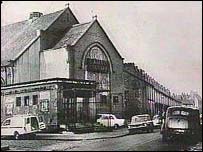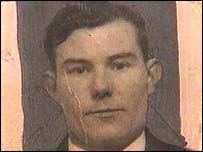George Kelly Exonerated 53 Years After Being Hung By
The Neck Until Dead
By Hans Sherrer (June 14, 2003)
George
Kelly was executed and Charles Connolly spent ten years in prison because prosecutors
concealed evidence they were not involved in an attempted robbery during which
two men were murdered
On June 10,
2003, England’s Court of Criminal Appeal quashed the 1950 conviction of George
Kelly for the March 19, 1949 murder of Liverpool’s Cameo Cinema manager during
a botched robbery. Mr. Kelly was hanged on March 28, 1950. On the same day the
Court also quashed the conviction of Kelly’s alleged accomplice, Charles
Connolly. Mr. Connolly had been convicted of robbery and conspiracy to rob the
cinema. Released in 1960 after ten years in prison, he died in 1997.

Cameo Cinema (1949)
The crime
became the focus of one of the most intense police investigations in English
history and over 65,000 people were questioned. However there were no suspects
until the police received a letter by an anonymous writer who offered to name
those involved in exchange for immunity. The police accepted the deal by
placing an ad in a local paper, the Liverpool Echo. The informant was James
Northam who claimed to have planned the robbery. He fingered 27 year-old
laborer George Kelly as the robber, and Charles Connolly, 26, as the lookout.
During the
botched robbery, during which no money was taken, the cinema manager and
another theater worker were killed. However, under British law each murder had
to be tried separately, so the two men were charged with the manager’s murder.
No physical evidence tied the men to the crime and the case against them, based
on shaky testimony, was so insubstantial that their 13 day trial ended in a
hung jury.
The men were
then retried separately: Connolly first. With the eyes of the nation focused on
him, he caved under the pressure and minimized his punishment by admitting at
his trial to participating in the robbery as the lookout. He was sentenced to
10 years in prison. However, Kelly steadfastly proclaimed his innocence. After
what was then the longest criminal trial in English history he was convicted of
murder on February 8, 1950. He was sentenced to death.

George Kelly
The quashing
of the convictions on June 10th was based on the prosecution’s concealment of a
statement that a Donald Johnson had confessed to the crime months before Kelly
and Connolly were tried. During the hearing, the government’s attorney
acknowledged that witness statements that could have destroyed the credibility
of the prosecution’s witnesses, including that of a senior police officer, were
concealed by prosecutors from Mr. Kelly and Mr. Connolly. Admitting that the men’s
trial had been unfair and the evidence against them was tainted, the government
did not oppose the quashing of Kelly’s conviction. [1] However it did oppose quashing
Connolly’s conviction. Although the same exonerating evidence was concealed
from both men, prosecutors could not acknowledge Connolly’s false confession
without publicly undermining its methods for obtaining convictions – which are
the same today as in 1950.
In announcing
the decision to quash both convictions, Lord Justice Rix said, “we regard the
circumstances of Kelly and Connolly’s trials as a miscarriage of justice which
must be deeply regretted.” [2] The Court did not act hastily. Over
28 months passed from the time the Court’s review of the case began on February
9, 2001, to its decision. [3]
The break in
the case came in 1991 when a person interested in Kelly’s case requested to see
the Merseyside police files. [4] The exculpatory information concealed
from Kelly and Connolly were in those files. The government admitted the
authenticity of the documents and offered no rebuttal to the information
concealed from the men. [5] Proving once again that the wheels
of “justice” turn slowly, it took 12 years for the two men to be officially
cleared by the courts.
During and
after the hearing the government’s attorney tried to deflect attention away
from formulating a conspiracy theory related to the concealed information.
However, an unknown number of police personnel and prosecutors knew Kelly and
Connolly were innocent. All of those people participated in a conspiracy of
silence as the men were wrongly convicted, sentenced, and Charles Connolly spent
a decade in prison and George Kelly went to the gallows.
Released from
prison in 1960, Charles Connolly lived for 37 more years protesting his
innocence, and that he had been pressured into confessing to a crime he didn’t
commit. He also lived everyday with the knowledge that for refusing to do what
he had done, an innocent George Kelly walked to the gallows in March 1950 and
was hung by the neck until dead.
Buried at the
Walton jail where he was executed, Mr. Kelly’s daughter, Catherine, will now be
able to bury him with other family members. She is represented by Mr. Makin, a
lawyer who has peripherally been involved in the George Kelly saga for over 50
years. When the case was accepted by the Court of Appeals he said, “I was a
very young solicitor, making a living by the sweat of my tongue, Frank and Joe
[George’s brothers] came to see me not long before Kelly was to be hanged to
complain about how George had been represented and about he injustice being
done to their brother. I could do nothing about it, and their faces haunt me to
this day.” [6] He described Kelly’s trial as a
“farce” and the case against him as a “fit-up” – but without the information
concealed by the prosecutors and police neither he nor anyone else could do
anything to stop Kelly’s execution. [7]
Eddie Connolly
said after the quashing of his brother Charles’ conviction, “A lot of doubters
at the time will have been proven wrong today. We’ve known all along that they
were innocent.” [8]
George Kelly’s
family wouldn’t let the case die, and the appeal of his conviction was driven
by their desire to clear his name. Thanks to them the British judicial system
finally admitted it erred by convicting him of a murder he didn’t commit – even
if it was 53 years too late to save his life.
THE END
ENDNOTES